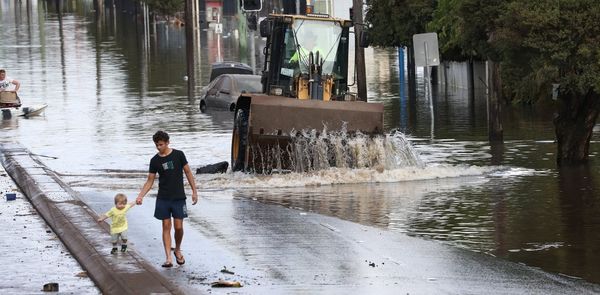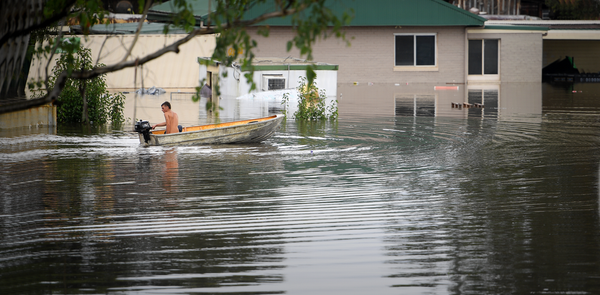
The Morrison government should expand its $10bn cyclone reinsurance pool in northern Australia to cover natural disasters – including catastrophic floods and bushfires – in other parts of the country, according to the scheme’s principal architect.
The veteran Liberal MP Warren Entsch campaigned for the scheme for more than a decade before Scott Morrison ultimately agreed to implement a reinsurance pool for northern Australia, backed by a $10bn government guarantee, which aims to protect more than 500,000 properties.
Entsch told Guardian Australia once the new arrangements were properly bedded down, the scheme should be expanded to other parts of the country given persistent extreme weather – like the current catastrophic flooding in Queensland and New South Wales – had rendered assets in other parts of the country uninsurable.
Asked whether recent disasters, including the current floods, had made the case to apply the government guarantee more broadly, Entsch replied: “Of course ... If there is any incentive to get this started, what we’ve experienced in the past week makes it a no-brainer.”
Legislation giving effect to the current proposal, which covers cyclones and related flood damage, has already passed the House of Representatives and is expected to clear the Senate during budget week in late March.
The scheme is supposed to be operational by July. The reinsurance pool for cyclones and related flood damage will cover residential, strata and small business property insurance policies in northern Australia.
Entsch, who holds the north Queensland electorate of Leichhardt, pursued the proposal because of constituent pressure. Insurance premiums in northern Queensland skyrocketed as cyclones and subsequent inundations became more frequent.
The veteran Liberal says he has already made the case internally “on numerous occasions” that the scheme needs to be extended nationally to cover fires and floods.
He said when he first started lobbying for the scheme back under the Rudd and Gillard Labor governments, he envisaged “some kind of catastrophe insurance, which would have covered a whole spectrum of events”.
But he said he met implacable resistance, first under Labor, and then from his own colleagues. He said treasurers, including Joe Hockey, had argued there needed to be clear evidence of market failure to justify any government intervention.
Entsch said the current scheme, once legislated, would be subject to a three-year review. He said he had lobbied Treasury ministers for an additional review at 12 months because “I’m not 100% sure we covered everything”.
He said the expedited review created the opportunity to fix gaps or oversights, which then allowed for a proof of concept that could be applied to other disasters around the country.
“What this does for us is create an opportunity of a scheme that’s going to work,” Entsch said.
“I suspect the value of it is going to be significantly higher than the $10bn we have set aside, but I think it’s something we can start to apply more broadly, once we’ve got it right, to include floods, fires and other natural catastrophes.”

Entsch said governments and planning authorities needed to remain focused on mitigation efforts, including not building on floodplains. But he said expanding the reinsurance pool was inevitable. “This is my baby and I want to make sure that it works.”
The veteran Queensland Liberal appealed to colleagues across political parties to “put your political hats in the bottom drawer”. He said collaboration, rather than partisan point-scoring, would ultimately ensure the government extended the scheme.
“Let’s work together and identify the flaws – and I expect there will be, this scheme is the first of its kind – and let’s fix them,” he said.
“I will give an absolute commitment that I will use all of the skills and nous I’ve developed in dealing with insurance companies – which I still don’t trust. I will be more than happy to continue to lead the charge, once we’ve got it right, to expand the reinsurance pool to cover other natural disasters in other parts of the country. That’s a fair offer.”
On Friday, the assistant treasurer, Michael Sukkar, left the door open to expanding the reinsurance scheme, noting on Sky News that the ACCC had found that cyclones cause “the most risk, followed by flood risk”.
Asked if the remit needed to expand, Sukkar said: “Given we’ve had such devastating floods two years in a row there’s no doubt that the funding we are providing will need to find agreement with relevant state governments and local governments to get these projects happening.”
But the Suncorp chief executive, Steve Johnston, rejected Entsch’s call, despite acknowledging it had supported the reinsurance scheme for cyclones in northern Queensland.
“All [expanding the scheme] would do would be to pass the buck from the private sector to the public sector, from the insurance market to the taxpayer,” he told ABC radio on Friday.
Johnston suggested governments should spend more on “mitigation and resilience” to save costs including the “psychological effect” of repeatedly rebuilding damaged homes.
The cyclone reinsurance pool for northern Australia, backed by a $10bn government guarantee, ensures insurers won’t lose money if they offer insurance products in the ares covered. The commonwealth is effectively insuring the insurance companies against any huge losses if they offer disaster cover.
The government expects the pool will reduce premiums by more than $1.5bn over 10 years.
However, a report by the Australian Competition and Consumer Commission recommended direct subsidies as a tool for bringing down premiums rather than the reinsurance pool the Coalition ultimately adopted.
The commission in late 2020 found reinsurance pools supported the insurance industry rather than improved affordability. The Insurance Council of Australia backed the ACCC’s findings at the time but now supports the reinsurance pool.










